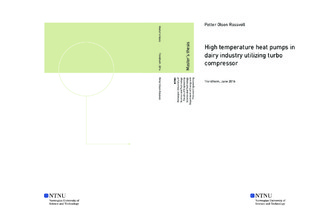High temperature heat pumps in dairy industry utilizing turbo compressor
Master thesis
Permanent lenke
http://hdl.handle.net/11250/2614775Utgivelsesdato
2016Metadata
Vis full innførselSamlinger
Sammendrag
Abstract
There exist several high temperature processes in UHT plants where a great amount of heat is wasted. To avoid this can energy efficient equipment be installed, such as high temperature heat pumps, which can recycles this heat. Water is the high temperature working fluid that gives the best performance and is ideal in UHT plants because it can be used directly in heating treatment processes. However, it has its disadvantages in extreme low density and high compressor discharge temperatures. New development in turbo compressor technology is making this technology interesting in water based heat pumps, because it can to an extent cope with these flaws. Well functioning water based heat pump systems show good performance in this specific application, but the question is if its performance is enough to make up for the reliability of unproven technology. Heat recycling through optimal heat exchanger networks is commonly used in UHT plants, and the advantages of such implementations make it difficult for new equipment to penetrate the marked.
The existing UHT system, in addition to four new systems with several different modifications, were included in a simulation model to compare the performance of the systems for constant operating conditions. Two of these new systems included an identical heat pump with turbo compressors. Optimal heat exchanger networks were made for all systems, and the main goals were to minimize the combined heat and power consumption, maximize the usable system surplus heat and thereby minimize the net heat and power deficit in the systems.
Minimum net heat and power deficit of 24.04 kW were obtained by a modified system utilizing an optimal heat exchanger network without a heat pump. The heat pump implementation managed a COP of 3.826, and energy savings of 419.04 kW compared to existing steam boilers for the same heating purpose. The energy savings from heat pumps were however less than the potential usable surplus heat from optimal heat exchanger networks without heat pumps. Whether or not this surplus heat can be utilized is not known, whereas the savings associated with the heat pumps are guaranteed. Additionally are some systems gaining performance by diminishing flexibility, and are more vulnerable to change in operating conditions than the existing plant.
There is suggested to conduct further work with an energy analysis on this specific UHT plant with varying operating conditions. An investigation of the modifications made in this thesis is another relevant approach for further work. Additionally is development of cheap oil-free turbo compressor technology necessary before it can be implemented in this specific application.
